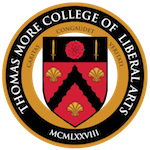By Peter Rao ’24
Following graduation, Sandra Kirby ’18 began work with the American Principles Project (APP)—a socially conservative think tank that engages in political advocacy on behalf of the family. Ms. Kirby’s interest in politics eventually brought her to Hillsdale College’s Van Andel Graduate School of Statesmanship, where she received an MA. She now works full time at APP as their Government Affairs Manager.
Ms. Kirby graciously offered to answer some questions about her experiences at TMC, the path she took after college, and what advice she would give to those thinking about life after graduation.
What brought you to Thomas More College? What aspects of the curriculum and culture appealed to you the most?
I’m pretty sure my mother threw the Newman Guide in my lap at twelve years old, but it wasn’t until my junior year of high school that I started visiting colleges. I had three criteria: small, Catholic, and Socratic. I sat through plenty of lectures at other colleges, but the smaller schools seemed to show a student body centered on “MRS degrees”; others seemed more focused on showing the development of their facilities; still others on their “progressive” dormitory arrangements. At one school I asked a student if any of the curriculum was taught Socratically, and the answer I received was, “Oh, uh, yeah… I mean, sometimes the professors use PowerPoint.” Not quite the answer I wanted.
But at TMC, I was impressed. I remember reading the assignment for a third-year humanities class. It was David Hume, “On Suicide.” I had come with a friend, and as we discussed it together, we both knew the essay was wrong, but couldn’t articulate why in a satisfactory way. When we attended the class, I expected the professor to walk the students through it, piece by piece. Instead, she asked a few questions about their thoughts, and as the students warmed up, they ripped the argument to pieces. If they got stuck, the professor asked another guiding question rather than giving them the answer. It was beautiful to watch. For the first time, I was seeing students learning to think instead of just noting down a professor’s thoughts and going through the motions. I knew it was what I wanted out of my college experience, and I hardly considered another school after that visit.
What interested you in the American Principles Project, and how did you get involved with the organization after graduating?
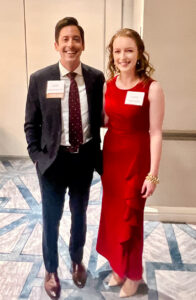
I wasn’t always interested in politics, but come junior and senior year, I was fascinated by our conversations on Rousseau, Tocqueville, Hobbes, and particularly Locke. That led me to a curiosity for observing politics “in real life.” I participated in The Fund for American Studies program the summer before senior year and was very much disenchanted by the bipartisan groups fundraising for various offices, which made me more curious about values-driven think-tank work over direct party operations.
But the reason I found APP was actually through TMC. Helena Davis (née Fahey) and Dominic Cassella started the Milk Street Society in our senior year, and I was the Programs Manager. We had Charlie McKinney come speak to the students about his work with Cornerstone. He mentioned a few groups in his talk, APP being one of them. Long story short, he connected me with their office, and I was able to intern with them over Christmas break.
At the time, their website focused on “human dignity” through a conservative lens, a very vague term that made me nervous about flexible moral foundations and overly broad issue areas. I was already thinking I’d like to be involved in family issues, though I didn’t yet know what that would mean tangibly. When I arrived on my first day, I received a small stack of company literature; at the top was their most recent piece, “The Contract with American Families.” Over the years, we’ve only become more focused on defending the American family and children’s innocence, which is everything I’ve hoped for in my career.
As for my moral concerns, the first thing I saw when I walked into my boss’s office was a crucifix hanging behind his desk. It turned out that many of the members of APP, including the founding president, were faithful Catholics.
As for the job itself, I had interviewed for teaching roles at a few charter schools, even flying out to Texas to meet with faculty, but two weeks into my internship, my boss offered me a position in Operations and kept it open for me until I graduated in the spring. I have never regretted that choice.
What made you pursue a master’s degree in politics? How did your education at TMC prepare you for the graduate program at Hillsdale?
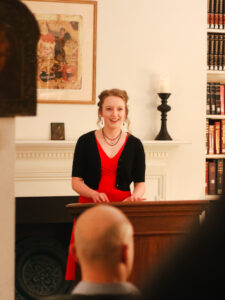 I had wanted to pursue graduate school right after college. I had a whole elaborate plan set out for my future the summer before senior year, but life happened and God laughed, so I was obliged to give it up.
I had wanted to pursue graduate school right after college. I had a whole elaborate plan set out for my future the summer before senior year, but life happened and God laughed, so I was obliged to give it up.
After graduation, I was working in Operations at APP, and I was good at it, but I already knew that it wasn’t what I wanted to do for the rest of my life. I was getting bored. I wanted to work in policy, getting into the meat of what happens, but there wasn’t room in our department at the time; plus, I still didn’t feel that I knew enough to perform the job well even if there had been. So, a politically oriented graduate school seemed the right fit to help me in all areas.
I spoke to my boss and negotiated a deal to work part time remotely while I pursued my next degree. I spoke to the Policy Director about hiring me in his department after graduation, and everything lined up beautifully, contingent on my doing well.
TMC rather spoiled me for any other school. I’ve never gone to another place where I respected the integrity of my professors more. Academically, I never felt behind in grad school—except perhaps in reading case law for the first time—but the Dean told me that was the case across the board for every student who didn’t come from a law background. The TMC Junior Project and Senior Thesis overprepared me for the presentation of my masters thesis as well. I walked out of my defense almost certain they were playing some sort of joke and would call me back at any minute to answer the real, tough questions.
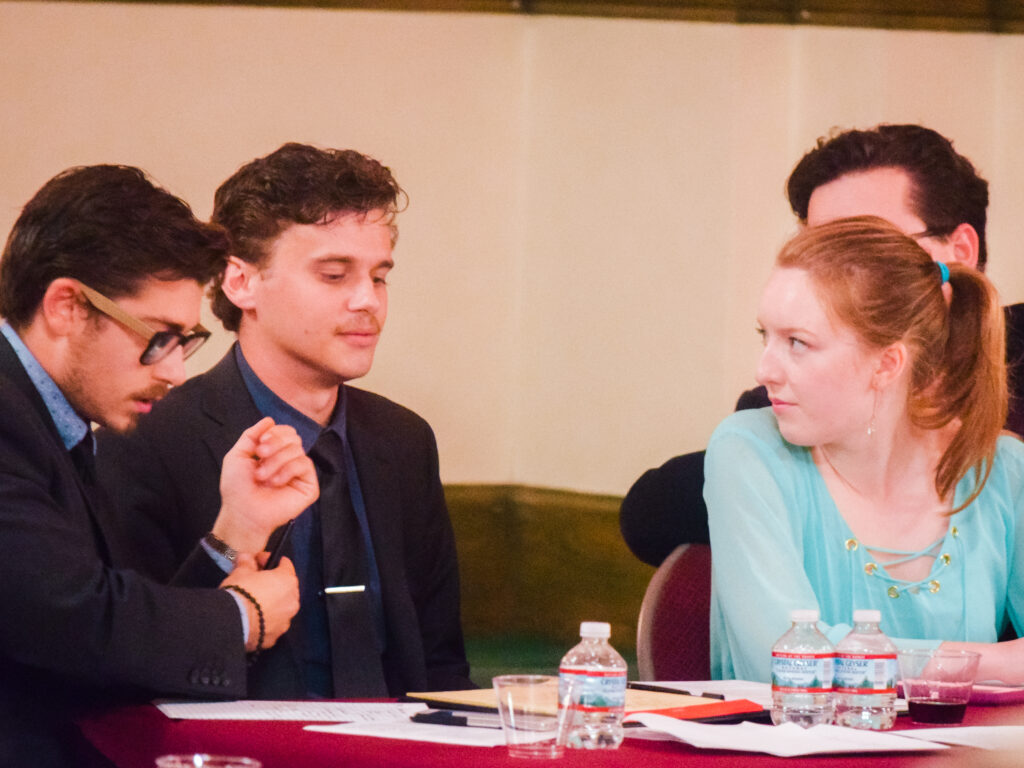
“For the first time, I was seeing students learning to think instead of just noting down a professor’s thoughts and going through the motions. I knew it was what I wanted out of my college experience.”
–Sandra Kirby ’18
In your job, you probably encounter some of the darkest realities and problems in our society—by that, I mean that your job seems to put you in a position where you are reminded constantly of the many things that need fixing. Does the work you do confirm your choice of education? Do you feel that TMC properly prepared you to deal with these sorts of problems?
We certainly do have to engage in some dark topics in our work, but it makes me exponentially more grateful for the TMC liberal arts experience. So many people engaged in these issues are lost and floundering; they have no concept of the Good, but they’re looking for it desperately and in all the wrong ways. Even people who collaborate with us at times have the same problem. They can see the evil of an aspect of something—say, medical transitions for minors—but they can’t grasp the full picture of how social transition harms everyone too. The problems are addressed in isolation, a product of our country’s sense of hyper-individualism projected onto everything around it. It’s hard to find solutions when there is no longer a sense of Aristotle’s aspirational “ought” driving people’s thought, but more of a Freudian baseness that’s merely accepted as an almost absolute of human nature.
I can’t tell you how often I meet people who think that “more options” are the solution to everything rather than focusing on providing good options. In many places they cannot even have a conversation about what is good and moral because it has to be a separate issue. It’s the dilemma of Euthyphro: what is sacred to one god is an offense to another; therefore no one can be said to be truly pious.
TMC did a wonderful job of presenting the human person, body and soul, with a purpose, outlining what happens when you try to divorce an object from its telos, and giving us hope through a proper understanding of what it is to be human; that while fallen, we are capable of so much more than simply wallowing in our circumstances.
Do you have any advice you could offer to students who are contemplating life after graduation?
My advice is to follow what truly excites you. God gives us our talents and loves for a reason, and we should take those as signs of where He wants us to live out our vocations. Pursue those interests in every opportunity given to you, and don’t take negative experiences as a waste. That being said, it’s just as helpful to know what you don’t want to do. And every chance you get, talk to people involved in your possible interest areas. No website, article, or TV show depiction can ever tell you what the job is really like. In my experience, people love to share what they do, and if you’re genuinely interested, they’ll even be happy to help you pursue it.
What are some of your fondest memories from TMC? Is there anything else you would like to share about your experience at the College?
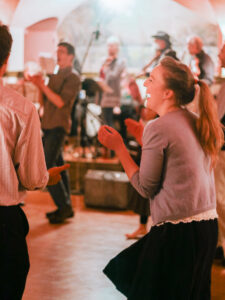 I think most TMC students speak fondly of their time in Rome—it certainly is one of the best times to bond with your classmates and enjoy new adventures together—and the community is one of the most darling elements of the New Hampshire campus. I’ll always find it a massive failing of the rest of the world that they aren’t dancing as often as TMC students do.
I think most TMC students speak fondly of their time in Rome—it certainly is one of the best times to bond with your classmates and enjoy new adventures together—and the community is one of the most darling elements of the New Hampshire campus. I’ll always find it a massive failing of the rest of the world that they aren’t dancing as often as TMC students do.
But I really truly enjoyed working on the Junior Projects and Senior Theses with my classmates. With everyone studying the same curriculum throughout the years, it was wonderful to see where their interests fell when they were able to choose what they studied. It also gave you a sense of how everyone approached their work. My class would help proofread our introductory remarks and run mock trials in preparation for our defenses, and the opportunity to teach your classmates something new and have them challenge you on your knowledge was a unique experience that brought us all together and strengthened the bond of community in a new way. It’s a very special circumstance to be surrounded by a tight-knit group of peers bonded through common community, faith, and intellectual pursuits. I certainly miss it at times, but I treasure the memories.

For further reading:
Life-long Learning: An Interview with Dr. Michael Dougherty ’95
How TMC Prepared Me for Grad School: An Interview with Esther Jermann ’20
